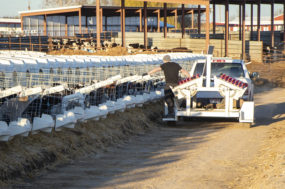Digest highlights
- U.S. establishing second USMCA dispute panel on Canadian dairy TRQ policies
- WOTUS lawsuit hearing set
- USDA launches Cattle Contracts Library
- FDA testing feed samples for PFAS
- USDA proposal keeps low-fat flavored milk as option in schools
- Booker seeks more AFO oversight
U.S. establishing second USMCA dispute panel on Canadian dairy TRQ policies
U.S. Trade Representative Katherine Tai announced that the U.S. is establishing a dispute settlement panel under the U.S. – Mexico – Canada Agreement (USMCA) regarding Canada’s dairy tariff-rate quota (TRQ) allocation measures.
In January 2022, an initial dispute settlement panel ruled Canada’s distribution of TRQ allocations for domestic processors undermined U.S. importers’ market access created under USMCA. Following that ruling, Canada introduced changes to its TRQ allocation measures, which the U.S. charged failed to meet USMCA obligations. A consultation between the two countries, held Jan. 17, 2023, failed to resolve the matter.
Under the timeline provided in the USMCA, once appointed, the panel would have 150 days to produce a draft report. If the panel confirms that Canada has been violating its obligations under USMCA, the U.S. would be granted the right to impose retaliatory duties on imports from Canada.
WOTUS lawsuit hearing set
An initial court hearing challenging a revised EPA and Army Corps of Engineers “waters of the U.S.” (WOTUS) rule has been scheduled for April 5.
Filed in the U.S. District Court in the Southern District of Texas in Galveston, the lawsuit is seeking to block implementation of the rule that redefines the jurisdiction of the Clean Water Act.
Seventeen farm, construction, real estate, oil and other organizations, including the American Farm Bureau Federation, National Cattlemen’s Association and National Pork Producers Council, filed the lawsuit a day after the proposal was published in the Federal Register.
Meanwhile, Republican members of the House and Senate co-sponsored resolutions of disapproval regarding the waters of the U.S. proposal.
Under the terms of the Congressional Review Act, Congress can strike down a federal agency rule if a resolution of disapproval is approved by both chambers and signed by the president. That’s unlikely, given that Democrats hold both the Senate and White House.
USDA launches Cattle Contracts Library
The USDA’s Agricultural Marketing Service (AMS) launched its pilot Cattle Contracts Library.
Designed to increase market transparency for cattle producers, the initial release of the library will allow users to browse a range of terms and information contained in active contracts used for the purchase of fed cattle. The information includes base prices and adjustments and contract specifications for such things as quality, yield, breed, weight, delivery, financing, profit/risk-sharing and more.
Starting Feb. 8, USDA-AMS is also planning a series of meetings and webinars to help stakeholders understand how to use the pilot library.
FDA testing feed samples for PFAS
The U.S. Food and Drug Administration Center for Veterinary Medicine (FDA CVM) has started a sampling project to explore levels of per- and polyfluoroalkyl substances (PFAS) in livestock feed samples.
The testing will help the dairy industry understand if PFAS chemicals are getting into feed and, if so, at what levels. According to the National Milk Producers Federation (NMPF), the project is set to run through the year, and the FDA assured NMPF it isn’t focused on dairy and is intended only to gain more knowledge around PFAS.
The FDA CVM plans to collect 60 different samples from randomly selected locations throughout the country. The samples will comprise 20 corn silage, 20 alfalfa hay and 20 corn grain samples. To date, 27 samples have been collected and 14 have been tested. All have come back non-detect for PFAS.
USDA proposal keeps low-fat flavored milk as option in schools
The USDA has proposed maintaining low-fat (1%) flavored milk as an option under proposed updates to school meal nutrition standards. While praising the step, heads of NMPF, NMPF member organizations and the International Dairy Foods Association (IDFA) continued to call on USDA officials to expand milk and dairy options in schools.
By law, the USDA is required to set standards for the foods and beverages served through the school meal programs, including nutrition standards that align with the Dietary Guidelines for Americans. Last year, the USDA issued modified transitional nutrition standards for school years 2022-23 and 2023-24 to give schools clear guidance after requirements were temporarily loosened during the height of the COVID-19 pandemic. It allowed local operators of the National School Lunch Program (NSLP) and School Breakfast Program (SBP) to offer flavored, low-fat milk for students in grades K through 12 and for sale as a competitive beverage. It also allowed flavored, low-fat milk in the Special Milk Program (SMP) and in the Child and Adult Care Food Program (CACFP) for participants ages 6 and older.
Final rule standards for milk are still under consideration. While low-fat milk options remain, the proposed rule by the USDA may limit the accessibility of flavored milk other dairy options due to new sugar and sodium limits.
For example, a pre-publication copy of the proposal said the USDA will consider a second option for milk. In addition to the proposal maintaining the current standard allowing all schools (grades K-12) to offer fat-free and low-fat milk, flavored and unflavored, a second proposal would limit milk choices in elementary and middle schools (grades K-8) to a variety of unflavored milks only.
The proposal was scheduled to be published in the Federal Register, Feb. 7. Public comments will be accepted until April 10. The USDA expects to issue a final rule in time for schools to plan for school year 2024-25.
Booker seeks more AFO oversight
U.S. Sen. Cory Booker (D-New Jersey) reintroduced a package of proposals designed to reform the country’s agriculture sector.
Calling the bill the ‘‘Industrial Agriculture Accountability Act of 2023,’’ the proposal calls for creation of an “office of high-risk animal feeding operation (AFO) disaster mitigation and enforcement” within the USDA. The office would be handling nearly all aspects of identifying and monitoring large livestock operations, regulating movement of livestock across state lines, establishing disaster mitigation plans, overseeing handling and slaughter, animal welfare, worker and environmental conditions.
Booker is a member of the Senate Committee on Agriculture, Nutrition and Forestry.
U.S. Reps. Ro Khanna (D-California), Jim McGovern (D-Massachusetts), Grace Meng (D-New York) and Earl Blumenauer (D-Oregon) introduced companion bills in the House.







